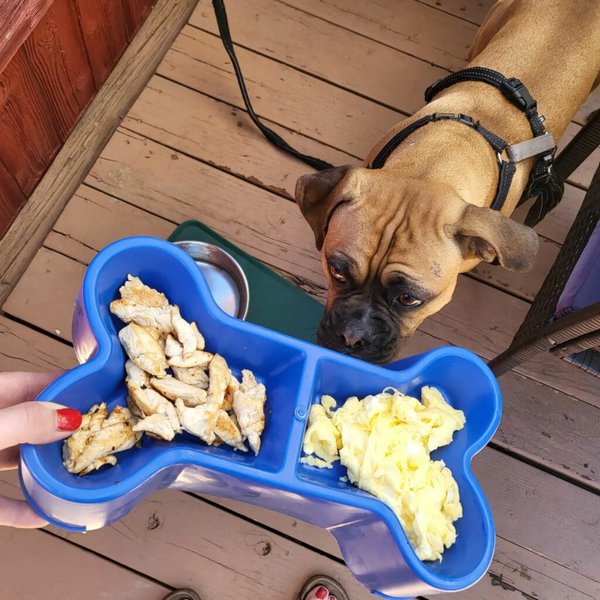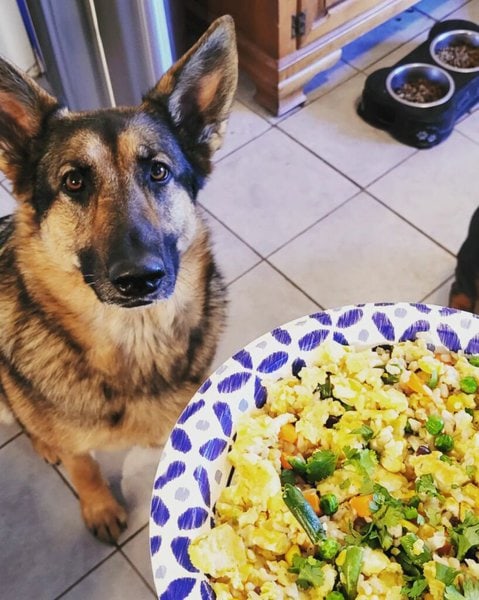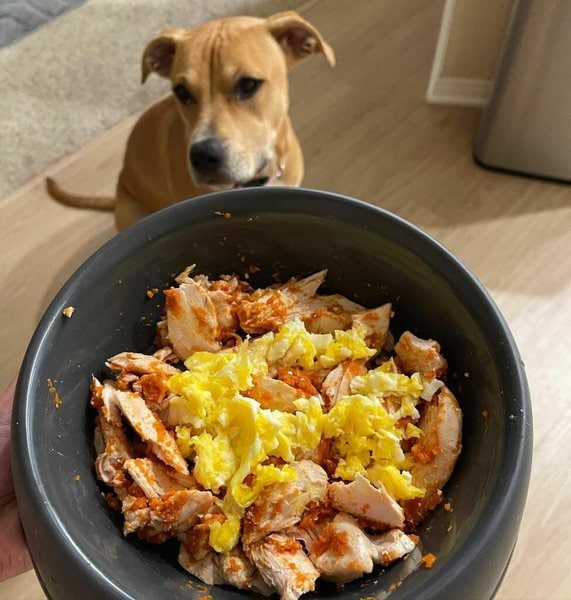When making breakfast, have you ever dropped some eggs only to have your dog quickly eat them up? Well, don’t worry. Eggs, when properly cooked, are beneficial to dogs, as they provide quality nutritional value to your canine friend. Cooking eggs kills and eliminates bacteria that may be present in raw eggs. But one may wonder how healthy scrambled eggs are for dogs and whether dogs can eat them as regularly as we do.
Yes, dogs can eat scrambled eggs as treats or snacks but not as their main diet. Eggs contain protein, vitamins, calories, and fatty acids. Scrambled eggs are nutritious, and your dog will likely be delighted to have scrambled eggs for a snack. Scrambled eggs have a lot of health benefits for your canine companion.
While there are benefits to feeding dogs scrambled eggs, there are some important things to keep in mind. For instance, the way you prepare scrambled eggs for dogs differs from how you prepare them for people. In this article, we review ingredients that are and are not safe to add when feeding your doggie and warning symptoms to watch for that may indicate your dog ate dangerous ingredients or eggs that weren’t fully cooked. First, let’s dive into how scrambled eggs benefit dogs’ health.
Can Dogs Have Scrambled Eggs?

Yes, pooches can have scrambled eggs. Eggs provide high nutritional value to dogs. Vets often recommend dog owners include eggs in the diets of their furry friends. This is because eggs contain easily digestible protein, vitamins, and other minerals.
Do Scrambled Eggs Stop Diarrhea For Dogs?
When your pup’s tummy troubles start acting up, feeding them scrambled eggs can help ease digestion.
Several things, such as viral infections, ingesting dirt, or even a small dietary change, may cause diarrhea for your furry friend. Parasites like hookworm and ringworm often cause intestinal infections. Doggies may contract parasites from ingesting feces or dirt.
When your pooch experiences regular gastrointestinal problems like diarrhea, take them to a vet. One of the first things your vet is likely to tell you is to feed only bland food to your dog. Scrambled eggs are at the top of that chart.
Eggs have high-quality protein that is very digestible for pups. Proteins in scrambled eggs are easy to digest and help with healthy stool formation.
Unhealthy Ingredients In Scrambled Eggs
But be careful when cooking scrambled eggs for your canine pal because some common ingredients that people add to eggs are unhealthy, or even dangerous, to dogs.
Avoid adding the following ingredients to scrambled eggs when feeding dogs:
- Onions
- Garlic
- Butter
- Oil
Onions
Onions are a no-go for dogs. They are, by far, the most dangerous food ingredient you can give your pooch.
Onions contain N-propyl disulfide, a dangerous and toxic compound to dogs. The sulfur compound clings to the oxygen molecules of a dog’s red blood cells and causes oxidative damage. This prevents the red blood cells from carrying oxygen properly.
Too much of this can destroy a dog’s red blood cells and lead to hemolytic anemia. So prevent your furry friend from eating the flesh of an onion, its leaves, juice, or even processed onion products like onion powder. All parts of an onion pose a serious health threat to your canine companion.
Garlic
Garlic toxicity can be fatal to dogs. Like onions, garlic is a member of the Allium plant family that is considered dangerous for dogs to consume.
Garlic contains thiosulfate, a toxic chemical substance for dogs. Thiosulfate causes oxidative damage to red blood cells. Garlic intake also causes severe gastrointestinal upset in dogs.
Butter
Butter is not toxic to dogs, and it may be safe for your pooch to eat small amounts. But high butter intake can lead to pancreatitis for your pet dog.
Also, some dogs are lactose-intolerant and may have an allergic reaction to dairy products. Visit your vet to understand if your dog can safely eat a small amount of butter.
Oil
Vegetable oil contains some allergens for dogs. For instance, common ingredients in vegetable oil, such as soybeans and corn, contain allergens.
Peanut oils may cause some dogs stomach aches. Cooked fats contain high sodium amounts and are unhealthy. Avoid adding peanut oil to your dog’s food.
Nonetheless, there are some healthy oils for pooches, such as olive oil or flaxseed oil. They help to condition dog coats and moisturize their skin.
Do Dogs Like Scrambled Eggs?

Yes, just like humans, dogs do love having their eggs scrambled. Long before they were domesticated, dogs were known to love eggs or meals containing eggs. Feeding scrambled eggs to your canine a few times a week is generally encouraged.
But always prevent your dog from eating raw or undercooked eggs. Try giving scrambled eggs to your canine friend as a treat or snack. Watch their love for you and this yummy snack increase.
Though dogs like scrambled eggs as much as people do, it isn’t safe for dogs to eat all the same ingredients we enjoy adding to eggs. We may add ingredients like spices or other flavors that may be toxic to dogs. So never add dangerous or toxic ingredients to the eggs you feed your dear Fido.
How Do You Make Scrambled Eggs For Dogs?
Scrambled eggs are very easy to make, and they’re even easier to make for your pooch. The eggs you feed your dog should not contain additives. Your dog’s eggs should be a simple and bland snack, free of extra ingredients or flavors.
Do not add the following list of ingredients:
Are you ready to cook scrambled eggs for your dog? Follow these steps:
- In a medium-sized bowl, crack at least two eggs.
- Beat eggs together thoroughly, ensuring the yolk and egg whites are well blended.
- Place the egg mixture into a cooking pan or hot skillet at medium heat. Adding a few drops of water or oil prevents the egg mixture from sticking to the pan.
- Cook for about 6 to 8 minutes. Continually turn the egg mixture with a spoon or spatula until the eggs are well-cooked or have a solid, scrambled look.
- Once the scrambled eggs are fully cooked, serve them to your pooch.
Feed scrambled eggs to your four-footed friends in small bits at first and watch their reaction.
Add a bit of cheese, hamburger, pork, or fish to create a more substantial meal. Cooking eggs for your dog takes less than 10 minutes. Always cook eggs thoroughly, and never feed raw eggs to your pooch.
What Can You Put On Scrambled Eggs For Dogs?
Although scrambled eggs are good on their own, adding a few toppings is not a bad idea. However, do not add pepper, onions, or seasonings that are toxic or dangerous to your canine friend.
Safe toppings you can add to your dog’s eggs include the following:
- Grated carrots
- Ground-up liver treats
- Blueberries
- Nori
- Canned pure pumpkin
- Yogurt
- Ground beef, chicken, turkey, or lamb
- Spirulina
- Canned sardines or mackerel
Do You Put Milk In Scrambled Eggs For Dogs?

While it is better not to add milk to your dog’s scrambled eggs, adding a small amount won’t hurt your pooch if they’re not lactose intolerant. Milk isn’t toxic to most dogs. But milk adds sugar, fat, and lactose to their diet, so avoid giving large amounts to your doggie.
Lactose is a popular allergen that can trigger negative reactions in some dogs. So adding milk to scrambled eggs may cause stomach problems for some dogs. Lactose intolerance may lead to GI distress, pancreatitis, diarrhea, vomiting, and other unpleasant symptoms.
Make sure your dog isn’t lactose intolerant so they don’t experience stomach upset or other unpleasant symptoms. Or avoid milk and dairy altogether if you don’t know your dog’s intolerance level.
Can You Put Cheese, Fish, And Flaxseed Oil In Scrambled Eggs?
You can add cheese, fish, and flaxseed oil to your dog’s eggs, but there are some important things to keep in mind before you do.
As with all dairy, make sure your dog isn’t lactose intolerant before feeding them any cheese. Even then, only serve cheese to dogs in moderation.
Don’t feed dogs blue cheese because your dog can become very sick. Don’t use cheese that contains ingredients like onion and garlic, which are toxic to dogs. Cottage cheese is lower in fat and lactose, so it is a popular option to add to dogs’ eggs.
Fish is rich in omega-3 fatty acids, which decrease inflammation. But make sure the fish doesn’t contain bones that could be a choking hazard for your dog. Because of the mercury content, do not feed dogs tuna. Try sardines instead, which are safe for dogs.
Flaxseed oil is known for its healing benefits: strengthening bones and maintaining dogs’ energy. So, it is a good idea to sprinkle a few drops of flaxseed oil on eggs while they are cooked. Like flaxseed oil, olive oil also provides antioxidants that benefit your canine friend’s cardiovascular health.
How Many Scrambled Eggs Should I Feed My Dog?
Talk to a vet about your particular dog’s dietary needs. The amount of scrambled eggs that will benefit your dog most depends on its size, activity level, and food sensitivities.
Always keep in mind the 10 percent rule; the number of eggs you feed your dog should not be higher than 10% of their daily calorie intake. This ensures your doggie’s meal is balanced and doesn’t contain excess calories.
As with any food, too much too often may cause obesity in pooches. So before adding scrambled eggs as a regular part of your furry friend’s diet, consult your veterinarian.
Are Scrambled Eggs Healthy For Dogs?
Yes, plain scrambled eggs are healthy and even nutritious for dogs. Scrambling does not reduce the nutritional value of eggs. In fact, it makes them more digestible.
Eggs are healthy for dogs because they contain the following beneficial ingredients:
- Protein
- Biotin
- Vitamin D
- Pantothenic acid
- Riboflavin
- Pyridoxine
- Vitamin B12
Are Scrambled Eggs Good For A Dog’s Upset Stomach?

Yes, scrambled eggs are often recommended for dogs with diarrhea. Experts recommend bland protein sources like scrambled eggs to settle a dog’s gut.
Dogs suffering from stomach upset or other illnesses may lose their appetite, but introducing scrambled eggs can help increase their appetite.
Salmonella Concerns For Dogs
Salmonella infection, also known as “salmonellosis,” is a widespread bacterial infection that affects the intestinal tract. It usually lives in animal and human intestines and is relieved through excreta.
Dogs often contract salmonella poisoning by eating items contaminated by such bacteria. These may include feces, dead animals, uncooked eggs, uncooked meat, and dog feeds.
Sometimes, pet food may be the source of salmonella infection. That is why some dog feeds and treats are recalled because of bacterial contamination.
The effects of salmonella in dogs can be chronic. Your dog can experience symptoms like fever, prolonged diarrhea, blood loss, and weight loss. The severity level differs from dog to dog.
Salmonella Is Zoonotic
“Zoonotic infection” means an infection transferred from animals to humans. Salmonella infection is communicable from animals to humans. So if your furry friend has salmonella poisoning, you can contract it too.
People can contract salmonella by kissing their dog or handling dog toys, food, or feces. Dogs are also prone to spreading bacteria in their saliva and stool.
Be very careful when handling a pooch with salmonellosis. Your doggie may take several hours before indicating salmonellosis symptoms, but sometimes they may not even show symptoms.
Symptoms Of Salmonella
Dog salmonella symptoms commonly appear 6 to 72 hours after your dog eats food contaminated with the salmonella bacteria.
Fever

A high fever is likely to be the first symptom you notice. Act fast before things get out of hand by visiting a vet.
Diarrhea
Your dog may develop diarrhea, and its feces may contain mucus, blood, or both.
Refusal To Eat (Anorexia)
Loss of appetite is one symptom of salmonella disease. Once you notice a loss of appetite, contact your vet as soon as possible.
Lethargy
Your canine friend loses interest in regular activities, becoming lethargic or displaying low energy.
Vomiting
Your dog may vomit blood, mucus, or both. When you notice these symptoms, immediately take your furry friend to the veterinarian or an emergency clinic. The vet may prescribe antibiotics to fight against the bacteria or prevent shock.





